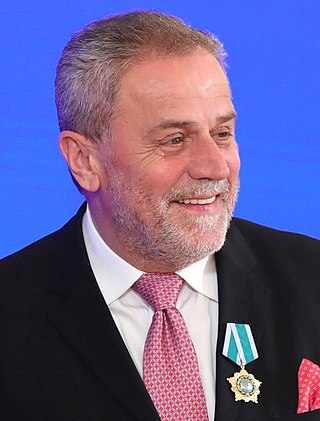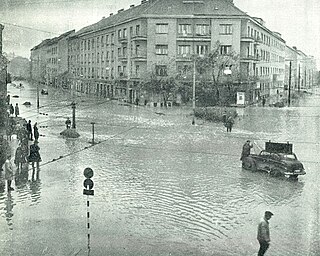
The culture of Croatia has historically been influenced by Central European, Mediterranean, and Balkan cultures. Croatia's unique culture and identity can be traced back to the historical llyricum. The Croatian language is believed to have been formed in the 6th or 7th century, with the written language present in Glagolitic texts from the 11th century.
Mate "Mišo" Kovač is a Croatian recording artist. He is the best selling artist from Croatia and former Yugoslavia, with well over 20 million records, cassettes and compact discs sold to date, and is often regarded as one of the most popular musical performers from Southeastern Europe.

Milan Bandić was a Croatian politician and the longest-serving mayor of Zagreb, the capital of Croatia. Bandić was mayor almost continuously from 2000 to 2021, except during the time between his resignation in 2002 and the 2005 election. He was also suspended from exercising his powers and duties for several months after his 2014 arrest over a corruption scandal. Out of Bandić's multifaceted engagement in politics, the most noted part was his mayoralty of Zagreb, which followed the Croatian Democratic Union's (HDZ) first post-socialist period of government (1990–2000), and exacerbated many existing transitional problems in the city.

OIV Tower Sljeme is a 169-metre (563 ft) tall TV and radio tower built of reinforced concrete on the summit of the 1035 metre (3450 ft) tall peak Sljeme of the Medvednica mountain north of Zagreb, Croatia.
This is a list of past and present rolling stock owned and operated by Croatian Railways, consisting of diesel locomotives, electric locomotives, diesel multiple units, electric multiple units and railroad cars. When the company began operation in 1991, it was with a collection of equipment inherited from "ŽTP Zagreb" – a Croatian division of Yugoslav Railways. Much of this equipment was later refurbished/modernized and remains in use today. Over the years, Croatian Railways has supplemented this initial fleet with new orders and with new acquisitions of secondhand equipment from other operators.

Croatia and Russia established diplomatic relations on 25 May 1992. Croatia has an embassy in Moscow and honorary consulates in Kaliningrad, Novosibirsk, and Sochi. Russia has an embassy in Zagreb and honorary consulates in Pula and Split.

KONČAR – Elektroindustrija d.d. is a Croatian electrical, transport and energy company based in the Trešnjevka neighborhood of Zagreb, Croatia.

1 Ilica Street is a building located in Ilica Street overlooking Ban Jelačić Square in the Lower Town area of Zagreb, Croatia. In Croatian, the building is colloquially known under the generic title Neboder as it was the first business skyscraper in the country.
Television in Croatia was first introduced in 1956. As of 2012, there are 10 nationwide and 21 regional DVB-T television channels, and there are more than 30 other channels either produced in the Republic of Croatia or produced for the Croatian market and broadcast via IPTV, cable, or satellite television. The electronic communications market in Croatia is regulated by the Croatian Regulatory Authority for Network Industries (HAKOM), which issues broadcast licenses and monitors the market. The DVB-T and satellite transmission infrastructure is developed and maintained by the state-owned company Odašiljači i veze (OiV).

Željko Turk is the current mayor of Zaprešić, a town in Zagreb County, Croatia.

Adris Grupa d.d. is a Croatian diversified conglomerate based in Rovinj. It has more than 8,000 employees, and is one of the leading companies in the region, with an annual income of more than 5 billion kunas.

TŽV Gredelj is a state-owned Croatian rolling stock company founded in 1894 as the railway workshops of the Hungarian State Railways.

The bombing of the Banski Dvori was a Yugoslav Air Force strike on the Banski Dvori in Zagreb—the official residence of the President of Croatia at the time of the Croatian War of Independence. The airstrike occurred on 7 October 1991, as a part of a Yugoslav Air Force attack on a number of targets in the Croatian capital city. One civilian was reported killed by airplanes randomly shooting civilians of the Tuškanac city district and four were injured.
Opinion polling for the 2015 Croatian parliamentary election started immediately after the 2011 general election. Monthly party ratings are conducted by Ipsos Puls, Mediana and Promocija Plus.

Nikola Moro is a Croatian professional footballer who plays as a midfielder for Serie A club Bologna and the Croatia national team.

On 25 October 1964, a devastating flood of the River Sava struck Zagreb, SR Croatia, SFR Yugoslavia. High rainfall upriver caused rivers and streams in the Sava catchment basin to swell and spill over their banks in many places throughout Slovenia and northern Croatia. The worst of the flooding occurred in Zagreb. Sava floods were a known hazard in the city, having affected the development of the area since the Roman times, and the 1964 flood did not have the largest extent. However, it occurred following several decades of large-scale industrialisation and urban growth which had caused the city to expand into the most flood-vulnerable areas. The quality of building construction and flood defences in the floodplain was mostly low. Regulation of the Sava and its tributaries upriver from Zagreb cut off many natural detention basins, such as fields and pastures, which caused water to pile up ahead of the city. To make matters worse, the soil was already saturated from a mid-month episode of fairly high rainfall. A second episode of high rainfall, during 22–25 October upriver in Slovenia, produced a record-high water wave in the Sava. At Zagreb's Sava River gauge, the water crested at 514 cm above zero level, exceeding the previous high water mark by more than half a metre (2 ft). This proved too much for the city's embankments. Around 60 km2 (23 sq mi) of the city was flooded, including most neighbourhoods on the western side of the floodplain.

On 10 March 2022 at 23:01 CET, an unidentified Soviet-made Tupolev Tu-141 reconnaissance unmanned aerial vehicle (UAV) crashed in Zagreb, the capital of Croatia. With an unidentified operator and unknown destination, the origin of the drone is presumed to be connected to military actions during the Russian invasion of Ukraine. The drone's flight over Croatia, Hungary and Romania prompted criticism of the countries' defense systems as the UAV was detected but not cleared. In response, the Croatian government restricted airspace over populous cities and received military support from France and the United States who dispatched multiple fighter-jets to Croatia days later for joint exercises.
Ukraine and Russia have had hostile relations since 2014 Russian occupation of Ukrainian peninsula of Crimea. In February 2022, a major escalation happened after Russia launched a full-scale invasion of Ukraine. This article concerns influence of Russo-Ukrainian conflict on Croatians and Republic of Croatia.

Zvijezda is a Croatian edible oil manufacturing and processing company headquartered in Zagreb. It is owned by the Fortenova Group.















